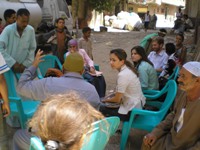Operational research and gender analysis
 An informal meeting with community leaders in Old Cairo, EgyptProgress towards gender and health-equitable health programmes and policies, and health for all, requires evidence on specific gender equity issues that impact health outcomes. This is needed to inform health policies and programmes, and develop cost-effective and actionable recommendations for Member States.
An informal meeting with community leaders in Old Cairo, EgyptProgress towards gender and health-equitable health programmes and policies, and health for all, requires evidence on specific gender equity issues that impact health outcomes. This is needed to inform health policies and programmes, and develop cost-effective and actionable recommendations for Member States.
The WHO Regional Office gender in health and development programme supports countries in operational research and gender assessments. Field research is conducted on specific gender issues in health, and desk/literature reviews are done on the role of gender in health policies, programmes and plans.
Gender analysis of health-seeking behaviour
Appropriate access to, and use of, health-care services is crucial for positive health outcomes. Men and women can have different patterns of health-seeking behaviour because of unequal decision-making power, restrictions on physical mobility and insufficient health literacy.
The social construction of men's and women’s roles and responsibilities (gender) determines access to resources and decision-making power within the family and community. This influences exposure to health risks, access to health information and services, health-care responses, health outcomes, and the social and economic consequences of diseases and ill-health.
The Regional Office's gender in health and development programme and the gender, women and health department at WHO headquarters, in collaboration with the WHO Kobe Centre, Japan, has developed quantitative and qualitative tools for conducting a gender analysis of access to, and utilization of, health-care facilities. A WHO-funded gender analysis was conducted in Pakistan in 2005 and in Afghanistan in 2010.
A gender analysis of health-seeking behaviour includes assessing:
- social influences on males and females in accessing and using health-care facilities
- resource barriers for males and females in accessing and using health-care facilities
- reasons for use of traditional healers versus health-care services by males and females.








